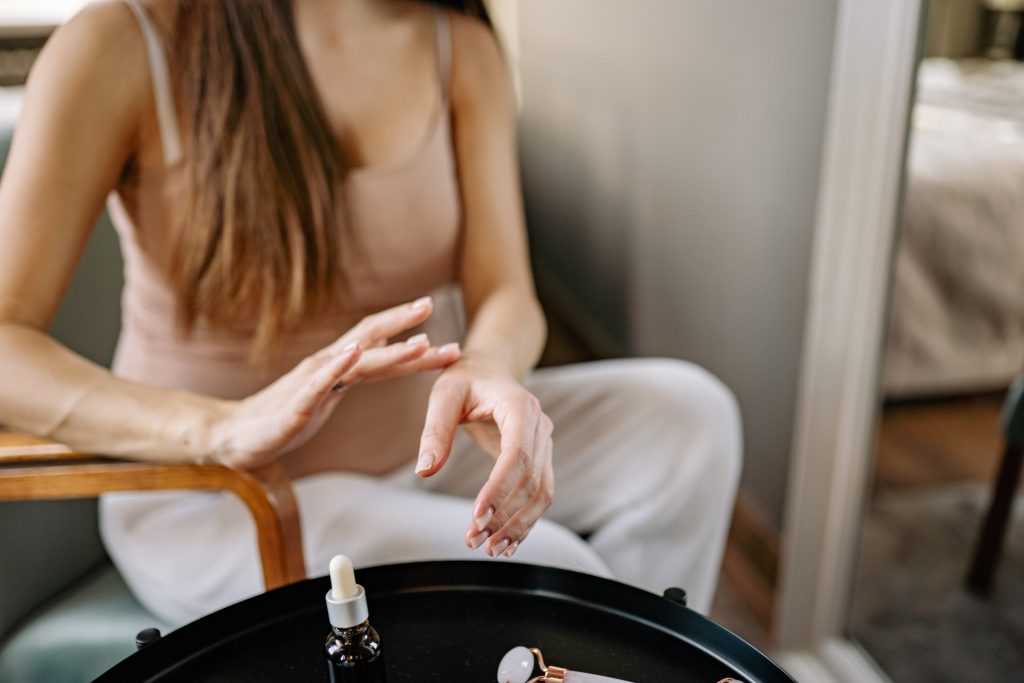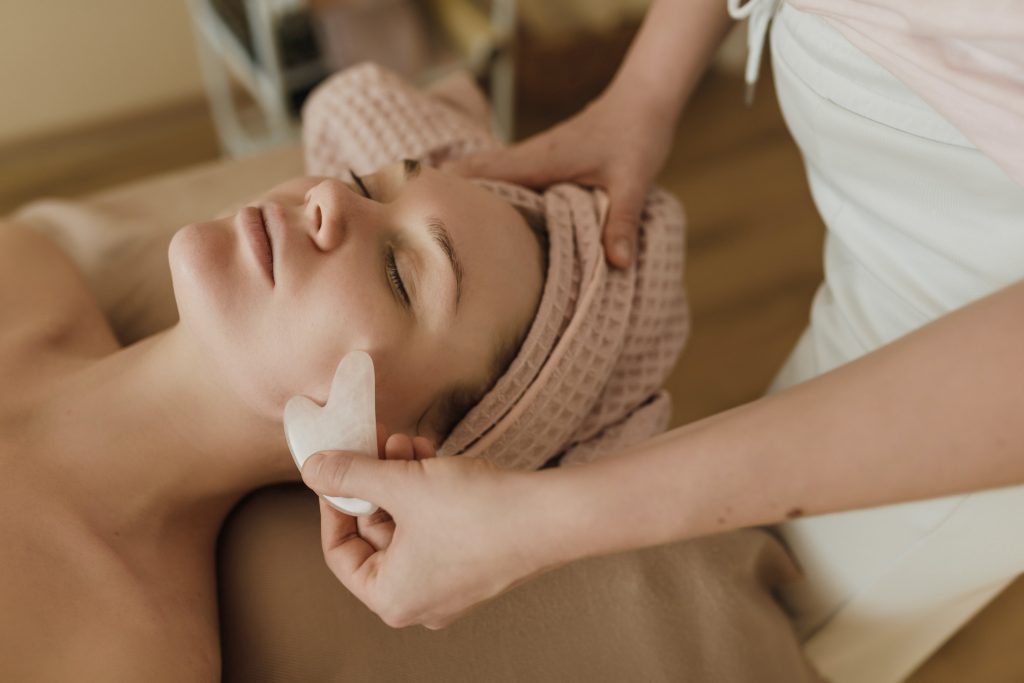Discover safe and effective ways to address acne and aging concerns during pregnancy without the use of retinoids.
Addressing Acne and Aging Concerns While Pregnant Without Retinoids

Pregnancy is a time of joy, anticipation, and…skin changes. Yes, that’s right! As if carrying a little bundle of joy inside you wasn’t enough, Mother Nature decides to throw some acne and aging concerns your way. But fear not, dear mama-to-be! In this article, we’ll delve into the world of pregnancy skincare and explore how you can address those pesky acne and aging concerns without the use of retinoids.
Understanding Acne and Aging During Pregnancy
Before we dive into the solutions, it’s important to understand why acne and aging sometimes team up during pregnancy. The culprit? Hormones, of course! Pregnancy hormones can trigger an increase in oil production, leading to clogged pores and breakouts. Additionally, these same hormones can affect collagen production, making your skin more susceptible to fine lines and wrinkles. Oh, the joys of motherhood!
The Connection Between Pregnancy and Skin Changes
During pregnancy, your body experiences a rollercoaster ride of hormonal changes. These hormonal shifts can wreak havoc on your skin, causing it to go from glowing and radiant to greasy and breakout-prone in the blink of an eye. It’s like your skin is going through its own little pregnancy journey!
As if the physical changes weren’t enough, the emotional rollercoaster of pregnancy can also impact your skin. Stress, anxiety, and mood swings can all affect your skin’s health and appearance. So, it’s not just the hormones playing a role, but also the overall state of your well-being.
Furthermore, the changes in your body’s blood circulation during pregnancy can also contribute to skin issues. Increased blood flow can cause your skin to appear redder than usual, and it can also lead to the formation of spider veins or varicose veins.
The Dual Challenge: Acne and Aging
Dealing with both acne and aging concerns can feel like a double whammy. You’re not just fighting one skincare battle, but two! But fear not, warrior mama, for we have some tricks up our sleeves to help you tackle these challenges head-on, all while keeping your baby safe.
When it comes to acne, it’s important to remember that not all treatments are safe during pregnancy. Many common acne-fighting ingredients, such as retinoids and salicylic acid, are best avoided. However, there are still plenty of gentle and effective options available, such as tea tree oil, witch hazel, and sulfur-based products. These can help reduce inflammation, unclog pores, and keep breakouts at bay.
As for aging concerns, prevention is key. While you may not be able to turn back the clock entirely, you can certainly slow down the hands of time. Incorporating a good sunscreen into your skincare routine is crucial, as sun exposure can accelerate the aging process. Look for a broad-spectrum sunscreen with an SPF of 30 or higher and apply it generously every day.
In addition to sunscreen, incorporating anti-aging ingredients like hyaluronic acid, vitamin C, and peptides can help boost collagen production and improve the overall appearance of your skin. These ingredients are generally safe to use during pregnancy, but it’s always a good idea to consult with your healthcare provider before introducing any new skincare products.
Remember, mama, you are beautiful inside and out, and these temporary skin changes are just a small part of the incredible journey you are on. Embrace the changes, take care of yourself, and enjoy the miraculous experience of growing new life.
Why Retinoids are a No-No During Pregnancy
Retinoids have long been hailed as the holy grail of skincare ingredients when it comes to fighting acne and reducing the signs of aging. However, when you’re expecting, retinoids should be shown the door. They are a big no-no during pregnancy, and here’s why:
During pregnancy, it is essential to be extra cautious about the substances we expose our bodies to. Research has shown that retinoids, when taken orally or applied topically in high doses, can potentially harm your unborn baby. They belong to a category of medications known as teratogens, meaning they have the potential to cause birth defects. Yikes! It’s best to steer clear of retinoids until after your bundle of joy has arrived.
But don’t worry, there are plenty of alternative options available that will help you address acne and aging concerns without putting your little one at risk. It’s always better to be safe than sorry, and the FDA agrees.
The Risks of Retinoids to Pregnant Women
When it comes to pregnancy, ensuring the health and well-being of both mother and baby is of utmost importance. Retinoids, such as isotretinoin (commonly known as Accutane) and tretinoin (found in prescription-strength creams), have been linked to an increased risk of birth defects when used during pregnancy. These birth defects can range from facial abnormalities to central nervous system malformations.
Studies have shown that retinoids can cross the placenta and reach the developing fetus, potentially causing harm. It is important to note that the risk of birth defects is highest when retinoids are taken orally, but topical application in high doses can also pose a risk. Therefore, it is crucial to avoid retinoids altogether during pregnancy to safeguard the health of your baby.
Additionally, retinoids have been found to increase the risk of miscarriage and premature birth. These medications can interfere with the normal development of the baby, leading to complications and potential long-term effects. It’s always better to err on the side of caution and prioritize the well-being of your little one.
The FDA’s Stance on Retinoids During Pregnancy
The Food and Drug Administration (FDA), the regulatory authority responsible for ensuring the safety of medications and healthcare products, advises against the use of retinoids during pregnancy. Their primary concern is the potential harm that these substances can cause to the developing fetus.
The FDA categorizes retinoids as Pregnancy Category C drugs, which means that studies in animals have shown adverse effects on the fetus, but there are no well-controlled studies in pregnant women. Due to the lack of sufficient human data, it is difficult to determine the exact risks associated with retinoid use during pregnancy. However, the potential for harm is significant enough for the FDA to recommend avoiding retinoids altogether during this critical period.
Rest assured, there are plenty of alternative options available to address acne and aging concerns during pregnancy. Non-retinoid ingredients like glycolic acid, lactic acid, and azelaic acid can be safe and effective alternatives. It’s always best to consult with your healthcare provider or a dermatologist to find the most suitable skincare regimen for your specific needs.
Remember, the health and safety of both you and your baby should always be the top priority. By avoiding retinoids during pregnancy, you can ensure a smooth and healthy journey towards motherhood.
Natural Remedies for Acne and Aging
When it comes to combating acne and aging during pregnancy, sometimes the best solutions can be found in nature. Here are a few natural remedies that can help you keep your skin clear and youthful:
Diet and Lifestyle Changes for Clearer Skin
Your diet plays a crucial role in the health of your skin. Incorporating foods rich in antioxidants and essential fatty acids can help combat acne and keep your skin supple. Some examples of antioxidant-rich foods include berries, leafy greens, and nuts. These foods help neutralize free radicals in your body, which can contribute to acne and premature aging. Essential fatty acids, found in foods like salmon, avocados, and flaxseeds, help maintain the skin’s natural moisture barrier and reduce inflammation.
In addition to a healthy diet, lifestyle changes can also make a significant difference in the appearance of your skin. Stress, lack of sleep, and smoking can all contribute to acne and aging. Finding healthy ways to manage stress, getting enough sleep, and quitting smoking can help improve your skin’s overall health and appearance. Exercise is also beneficial for your skin as it improves blood circulation, delivering oxygen and nutrients to the skin cells and giving your complexion a healthy glow.
Topical Treatments Safe for Pregnancy
While retinoids are off-limits during pregnancy, there are plenty of pregnancy-safe topical treatments that can help you tackle acne and aging concerns. Look for products containing ingredients like glycolic acid, lactic acid, or salicylic acid in low concentrations. These gentle exfoliators can unclog pores, remove dead skin cells, and stimulate collagen production without risking harm to your little one.
Glycolic acid, derived from sugar cane, is a natural exfoliant that helps remove the outer layer of dead skin cells, revealing a brighter complexion. Lactic acid, often found in milk and yogurt, gently exfoliates the skin and helps improve its texture and tone. Salicylic acid, derived from willow bark, is known for its ability to penetrate the pores and dissolve excess oil and debris, effectively treating acne.
It’s important to note that even though these ingredients are considered safe during pregnancy, it’s always a good idea to consult with your healthcare provider before starting any new skincare regimen.
By incorporating these natural remedies into your skincare routine, you can effectively combat acne and aging during pregnancy while ensuring the safety of both you and your baby. Remember, taking care of your skin is not only about looking good but also feeling confident and comfortable in your own skin.
Professional Treatments for Acne and Aging
If you prefer the pampering touch of a professional, fear not! There are safe facial treatments you can indulge in during pregnancy:

Safe Facial Treatments During Pregnancy
Opt for facials that focus on gentle exfoliation and deep cleansing. Avoid treatments that use harsh chemicals or strong acids. A soothing facial massage can do wonders for relaxation and blood circulation. Consider seeking out an aesthetician experienced in pregnancy skincare to ensure they are well-versed in the do’s and don’ts for mamas-to-be.
The Role of Dermatologists in Pregnancy Skincare
Your friendly neighborhood dermatologist can be your ally in navigating pregnancy skincare. They can provide professional advice tailored to your specific concerns and recommend safe skincare products and treatments. Make sure to inform them about your pregnancy so they can guide you appropriately. It’s good to have a skincare superhero by your side!
Maintaining a Healthy Skincare Routine During Pregnancy
Now that we’ve covered the essentials, let’s talk about how to establish a pregnancy-safe skincare routine to keep your skin in tip-top shape:
Essential Steps in a Pregnancy-Safe Skincare Routine
Cleanse, tone, moisturize, and protect! These are the key steps in any skincare routine, and they remain just as important during pregnancy. Choose gentle, fragrance-free products to minimize the risk of irritation. Don’t forget to slather on that sunscreen, as pregnancy hormones can make your skin more susceptible to sun damage. It’s time to be a skincare superstar!
Products to Avoid During Pregnancy
While there are plenty of safe options out there, it’s also essential to be aware of certain ingredients that are best left out of your pregnancy skincare routine. Say no to products containing retinoids, benzoyl peroxide, and salicylic acid in high concentrations. Remember, when in doubt, always consult with your healthcare provider or dermatologist.
So there you have it, mama-to-be! With a little knowledge and some gentle TLC, you can address those acne and aging concerns without the use of retinoids. Embrace this beautiful journey and let your inner pregnancy glow shine, blemishes and all. Remember, you’re growing a tiny human inside you, and that’s nothing short of amazing. Now go forth, rock that pregnancy glow, and show the world that pregnancy skincare can be playful and safe!





